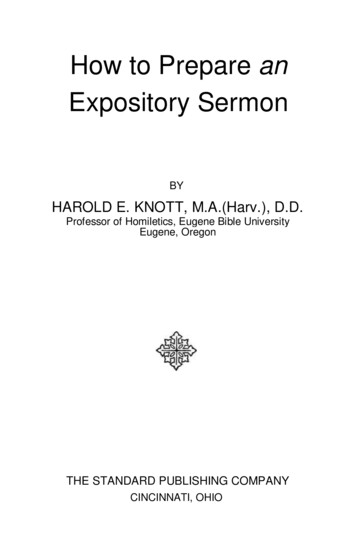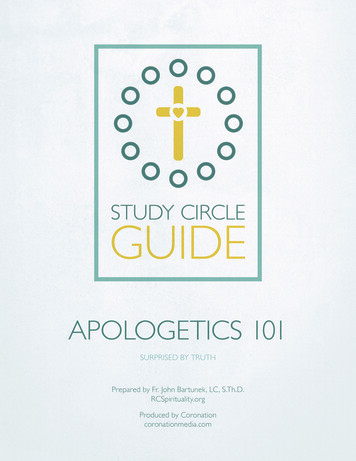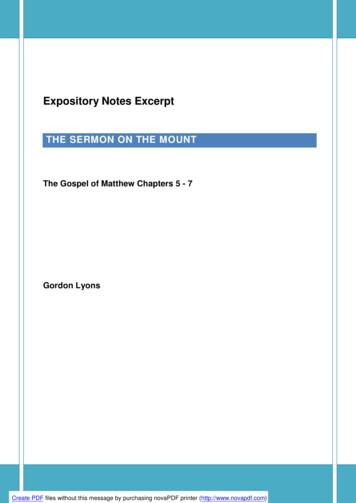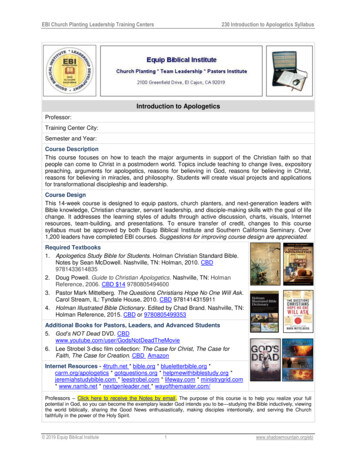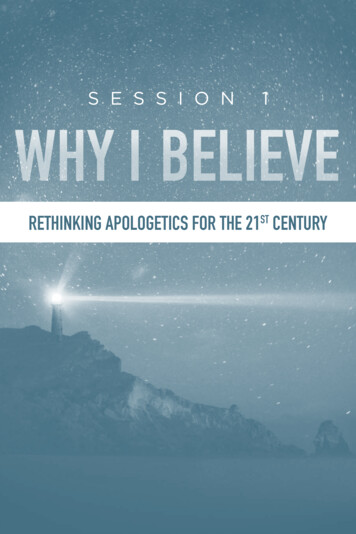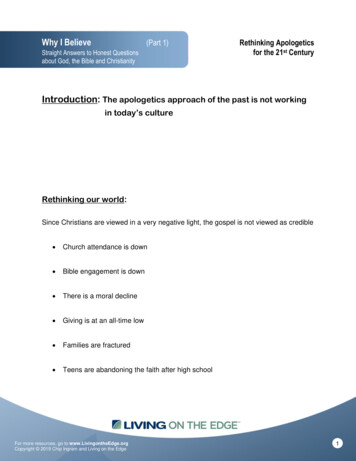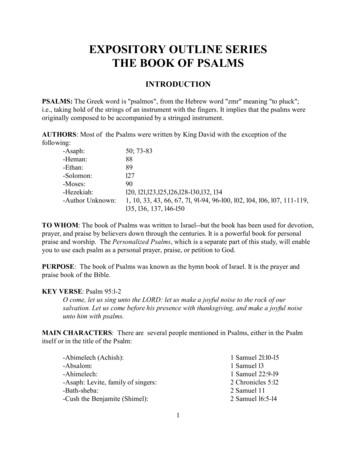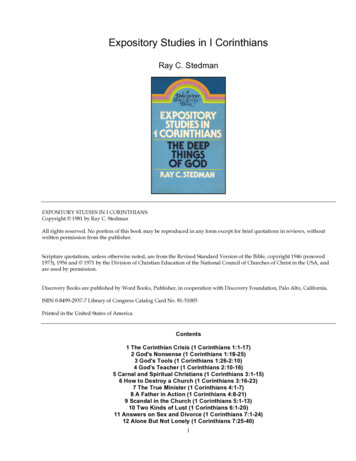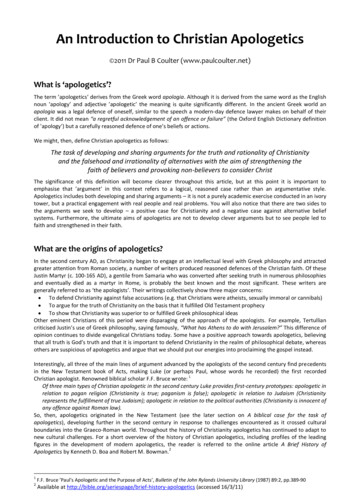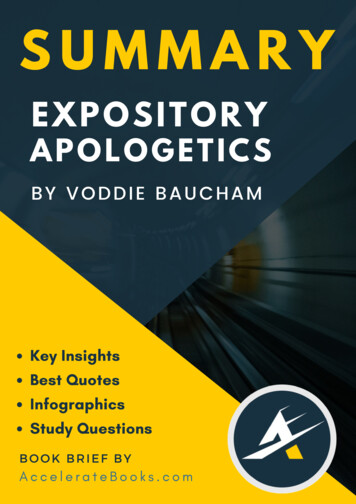
Transcription
SUMMARYEXPOSITORYAPOLOGETICSBY VODDIE BAUCHAMKey InsightsBest QuotesInfographicsStudy QuestionsBOOK BRIEF BYAccelerateBooks.com
OVERVIEWExpository Apologeticsnormal conversation—both from the pulpit andin everyday life?Aimed at preparing you to clearly andconfidently defend your faith, ExpositoryApologetics sets forth an approach toapologetics that is rooted in Scripture andeminently accessible.Filled with real-world examples and practicaladvice, this book will equip you with the toolsyou need to think biblically and conversepersuasively—offering unbelievers “a reasonfor the hope that is in you.”ABOUT THE AUTHORVoddie Baucham was born and raised in LosAngeles, California to a single Buddhist mother.He moved to Texas to play college football andwas converted to Christianity through theconversations with one of his teammates.Author: Voddie BauchamPublisher: CrosswayDate: August 21, 2015Pages: 208Baucham will usually tell his testimony withhow his conversations with his teammaterevolved around asking hard questions aboutChristianity. Now, as a Christian, his ministry ispermeated with apologetics.OVERVIEWAfter pastoring in Texas for most of his pastoralcareer, Voddie and his family followed God’scall to serve in Zambia as the Dean of theSeminary for African Christian University.Apologetics is for everyone.The Bible is clear that all believers are called todefend their faith. However, if apologetics isthe formal process that we have come toexpect, this sounds like an impossible task. Butwhat if apologetics could be part of natural,Authorized use for Registered Members Only1 2018 Accelerate Books. All Rights Reserved.
MAIN IDEAExpository ApologeticsMAIN IDEAThis book is meant for the “average” Christianto be competent in having conversations aboutthe truths of Christianity. Speaking truth to theunbeliever is the task of the apologist, notnecessarily articulating airtight logicalarguments to crowds of people.Expository Apologetics is an introductoryguide to the “nature and practice ofapologetics.” This book is about the practicalapplication of the methodology known as“presuppositional apologetics.”Presuppositional apologetics is a methodologythat assumes the truth claims of the Bible andargues from that “presupposition”. It does notseek to “prove” the authority of the Bible, butinstead, it seeks to show the foolishness of theunbelieving worldview by exposing anddismantling the “presuppositions” thatundergird the beliefs and practices of anunbeliever.Every person in the church can learn insightsfrom this book that can help them speakconfidently about their faith in everydayconversations.This method ultimately serves the purpose ofevangelism. This approach is not merely for the“elite Christian” scholar or professionalapologist, but for every believer. EveryChristian is called to be ready to give a defenseof the faith they hold.This methodology boils down to three things:knowing what you believe, why you believe it,and being able to communicate that to otherpeople.This book presents a wide, but very wellrounded set of tools for the average person toexpress the faith to an unbeliever, and the onlything someone needs to know is their Bible.The Bible is the source of authority andargument in the task of apologetics.Authorized use for Registered Members Only2 2018 Accelerate Books. All Rights Reserved.
KEY INSIGHTSExpository Apologeticswith that truth. The Bible is the word of God; hespoke it to his people and it is completelytrustworthy.KEY INSIGHT #1Christians must believe in these truths andaccept them. Most Christians hold these truthsas absolute until they approach another personwho does not believe the same things.However, the task of the apologist does notbegin with assuming the position of theunbeliever and reasoning with them to a placeof belief. Rather, we must begin with thepresupposition that God’s word is truth.Exposition asApologeticsThe Bible is the best toolfor defending theChristian faith.Abdicating the position of authority and truththat has been given is foolishness. Expositionas apologetics is the complete opposite. Itassumes the truthfulness of the biblical textand therefore speaks that truth to theunbeliever. Scripture is sufficient for everygood work (1 Tim 3:16), and that includes thetask of apologetics.In the first chapter of the text, Voddie Bauchamdefines his method of Expository Apologeticsas, “the application of the principles ofexposition to the art and science ofapologetics” (p. 20)This definition to be quite simple, yet theimplications are incredibly profound for thetask of the believer of defending and explainingthe faith to the unbelieving world.The Christian must not be afraid ormanipulated into thinking they are not allowedto use the authority of the Scriptures to engagethe unbeliever. Have the confidence to standon what God has said and you will not have toworry about argumentation, debate, oranything else that may seem intimidating.Jesus says that He is “the truth.” Paul states“all the treasures of wisdom and knowledgeare hidden in Christ Jesus;” the Old Testamentproclaims the “beginning of knowledge is thefear of the Lord.” Christians need to be firm intheir commitment that the Word of God istruth.All these statements show that in the worldGod has created, what he has said is the truthand what he has done in creation is consistentAuthorized use for Registered Members Only3 2018 Accelerate Books. All Rights Reserved.
KEY INSIGHTSExpository ApologeticsINSIGHTGRAPHIC #1Authorized use for Registered Members Only4 2018 Accelerate Books. All Rights Reserved.
KEY INSIGHTSExpository ApologeticsHere is the key of presuppositional apologetics:even the unbeliever must assume Christianprinciples to justify anything they claim to betrue.KEY INSIGHT #2Because this world belongs to God and is madeto reflect who God is, everything the unbelieverclaims to be true is true if and only if God hasmade it true. Unbelievers will suppress thisknowledge and reject who God is.EngagePresuppositionsExpose how the unbelievingworldview is inconsistent.The task of the apologist is to point out theinconsistency in the unbelieving worldview andpresuppositions that the unbeliever may have;their task is to expose the unbelievingpresuppositions and show how the unbelievermust “steal” from the Christian worldview tomake sense out of the world around us.Every person’s worldview has certainpresuppositions that provide the necessaryfoundations for what they do and do not do.Unfortunately, most people do not think muchabout these presuppositions, especially whenconsidering how their presuppositions willdetermine how one thinks and where aperson’s ultimate authority rests.For example, the atheist may assume aposition of naturalism in which everything inthis world can be accounted for because ofnatural causes. A presupposition of thisworldview is the principle of induction, whichbasically states that the natural order remainsconsistent.By its very nature, Expository Apologeticsencourages the believer to challenge theunbeliever’s presuppositions. It does this byusing the truth of Scripture as the startingpoint.The atheist actually cannot account for thisprinciple in their own worldview and must“steal” it from the Christian worldview.Christians can justify scientific enterprise withinduction because Christians know God hasmade his creation to fit a uniform pattern (seeGenesis 8:22).The Believer will assume the authority of theBible as the starting point for what they knowto be true and use that as the presuppositionfor whatever else they believe.The Unbeliever does not do this; they willarbitrarily assume other authorities as ultimatearbiters of truth and reject what God has said.Authorized use for Registered Members Only5 2018 Accelerate Books. All Rights Reserved.
KEY INSIGHTSExpository ApologeticsINSIGHTGRAPHIC #2Authorized use for Registered Members Only6 2018 Accelerate Books. All Rights Reserved.
KEY INSIGHTSExpository Apologeticsthen their need of a savior.KEY INSIGHT #3Answering objections and providinginformation serves as the bridge or means ofproclaiming the gospel to people. The task ofthe apologist should never be divorced fromgospel proclamation.Speak to UnbeliefThe goal of apologetics issaving souls, not winningarguments.This insight is helpful as we apply the practiceof apologetics to the internal ministry of thechurch. Every person in the church has beliefsand ideas that are unbiblical; no one has beenperfectly sanctified in this life.Speaking to unbelief is to ensure that themessage of the gospel must come into contactwith the false beliefs of the audience. Thisconflict will point out the necessity of theperson’s inconsistent worldview, leading to aconversation about the gospel.Pastors and other church leaders need to bepreaching to combat those unbiblical beliefs inthe hearts of their congregants. Instead ofinstructing people to “do” things differently,pastors must encourage them to “believe”things differently.Many times, when conversations lead into thegospel or truths of Christianity, the temptationmight be to merely defend facts andarguments. These things are good but there isso much more to be done in the interaction.This is the difference between preachingmoralism and preaching the gospel. Preachingmoralism only presents people with a new lawand produces legalism. Preaching to unbeliefproduces grace filled hearts as people believedifferently.This is an important point: if the problem isinformation, then our apologetic becomes atask of information giving. However, theproblem before us is not that someone doesnot have information, but that they are sinnersrebelling against God.The unbeliever’s primary responsibility is torepent and believe (p. 50). The task of theapologist in the interaction then is to steer theperson first to a recognition of their sin andAuthorized use for Registered Members Only7 2018 Accelerate Books. All Rights Reserved.
KEY INSIGHTSExpository ApologeticsINSIGHTGRAPHIC #3Authorized use for Registered Members Only8 2018 Accelerate Books. All Rights Reserved.
CHAPTER SUMMARIESCHAPTER 1: WHAT ISEXPOSITORYAPOLOGETICS?open opposition to biblical truth, and thegrowing presence of opposing religions.” (p.24)Expository Apologetics is the application of theprinciples of exposition to apologetics. TheBible is the greatest weapon a Christian hasagainst the unbeliever. Use the truth ofScripture as your authority in yourconversations with unbelievers. Since Scriptureis truth, present your case from the positionthat assumes its’ veracity.APPLICATION QUESTIONSIn your conversations with unbelieversabout Christianity, do you use the Bible todefine terms or answer objections?What is the main goal of engaging inapologetics?Point out the inconsistencies of otherworldviews. Unbelieving systems have to relyon God’s truth and his world, “borrowing” fromthe Christian worldview to make sense of theirown. By exposing these inconsistencies, showthe unbeliever their view of the world isultimately incoherent and use this to proclaimthe gospel.CHAPTER 2: 1 PETER 3AND THE ESSENCE OFAPOLOGETICSThe task of the apologist comes fromproclaiming the righteousness found in Christ.Christ is the one who died, was buried and wasraised from the dead to save sinners.Unbelievers oppose this righteousness in theirunbelief. In their unrighteousness, those whodo not believe suppress the truth of who God isand the gospel.QUOTES“Expository Apologetics is merely theapplication of the principles of biblicalexposition to the art and science ofapologetics.” (p. 20)“Apologetics is necessary today because ofthe issues such as biblical illiteracy,postmodernism/post-Christian thinking,Authorized use for Registered Members OnlyExpository ApologeticsEvery believer is called to explain the truth theybelieve in. They are to do this with a spirit of9 2018 Accelerate Books. All Rights Reserved.
CHAPTER SUMMARIEShumility and with a confidence in the truth.Always remember Christ as the foundation andgoal of the witness to the unbelieving andhostile world.CHAPTER 3: WHYUNBELIEF?Every person knows God but suppresses thatknowledge in unbelief. The Bible says that theproblem with the unbeliever is not aninformation problem, but a spiritual problem.The task of apologetics is to confront thatunbelief with the gospel.QUOTES“The idea that apologetics is for a select fewmust give way to the clear teaching ofScripture, which places the practicesquarely at the feet of every believer.” (p.38)Only the gospel has the power to overcome theperson’s unbelief and convert them.Apologetics can never be divorced fromevangelism. Apologetics is the defense of thesame faith proclaimed in evangelism. Since it isthe same, every conversation involvingdefending the faith should also have at its heartthe proclamation of that same faith.“Instead of being a tool that alleviates thetension between us and the world,apologetics is often a tool that heightensthat tension.” (p. 43)APPLICATION QUESTIONSQUOTESWhy should you interact with unbelievers ina respectful and winsome way?“Any approach to apologetics that is notcentered around the gospel is insufficient.”(p. 56)How is the task of Christian apologeticsdifferent from other debates?Authorized use for Registered Members OnlyExpository Apologetics“In addition to refusing to believe anyonewho calls himself an atheist, and remindingpeople of what they already know, we mustalso refuse to make the fool God’s judge.”(p. 61)10 2018 Accelerate Books. All Rights Reserved.
CHAPTER SUMMARIESAPPLICATION QUESTIONSExpository ApologeticsQUOTESDo you hesitate to share the gospel withsomeone because of the potential negativeresponse?“Paul’s approach to apologetics was notdependent solely upon his ability tocomprehend and interact with randomfacts. Instead, he was dependent uponGod’s revelation as his primary and ultimatesource of authority.” (p. 74-75)Can you explain why every believer isresponsible for apologetics?“Expository Apologetics does notnecessarily require direct quotes fromScripture.” (p. 75)CHAPTER 4: PAUL’SEXPOSITORYAPOLOGETICAPPLICATION QUESTIONSWhy is the Bible the ultimate source ofauthority in apologetics?Paul’s approach to apologetics and evangelismis a good example to follow for Christianstoday.Must you always begin an apologeticconversation the same way?In every situation he found himself in, Paul wasable to bring the truth of Scripture to bare.Provide a robust worldview in your answers toobjections: what you win people with is whatyou will win them to. Methodologies andarguments that dismiss or ignore the Biblecreate Christians with Biblically-averse faith.If a person’s faith was dependent on evidence,then evidence can dissuade them as well. Thebiblical plotline, “creation-fall-redemptionconsummation,” is a good guide to showpeople the grand narrative of Scripture.Authorized use for Registered Members Only11 2018 Accelerate Books. All Rights Reserved.
CHAPTER SUMMARIESCHAPTER 5: LEARNINGAPOLOGETICS THROUGHCREEDS, CONFESSIONS,AND CATECHISMSequipped to engage in expositoryapologetics.” (p. 86)“If we understand apologetics as thevindication of the Christian world and lifeview against all others then creeds,confessions and catechisms become morethan mere historical novelties. These areactually the essential tools of our trade.” (p.102)Creeds are the earliest forms of apologetics wehave access to, representing the collectivewisdom of the Church. From the earliest daysof Christianity, creeds have played a vital role inpassing the faith down through thegenerations.APPLICATION QUESTIONSConfessions are stable systematic expressionsof Christian truth. Arising from the Reformationperiod onward, confessions have been themain expression of a church’s doctrine andpractice.What makes creeds, confessions andcatechisms so useful for the apologist?Could you answer the basics of the Christianfaith if a child asked you questions?Catechisms provide a base for apologeticdiscipleship with their question-answer formatto basic questions about Christianity. Theyanswer so many of the basic questions aboutfaith with insights from learned andexperienced individuals throughout the historyof the church.CHAPTER 6: THE TENCOMMANDMENTSThe Ten Commandments form the expressionof the moral law, which every person isaccountable to. This law is written on the heartof every person. The moral law stands as theethical standard every person innatelyunderstands.QUOTES“If we familiarize ourselves with the basiccategories of questions and the key biblicaltexts that address them, we will be wellAuthorized use for Registered Members OnlyExpository ApologeticsThis is a specific way in which people know Godexists, yet still, try to pretend he does not.12 2018 Accelerate Books. All Rights Reserved.
CHAPTER SUMMARIESExpose people’s inclination to know God’s lawyet reject the God who gave it. Everyone has asense of morality and knows intuitively whensomeone commits a crime and should bepunished. They are expressing their moraloutrage at the moral law being broken.CHAPTER 7: BASICOBJECTIONSWe must seek to understand the commonobjections people bring to the conversation,especially in regard to the Law of God.Unbelievers will reveal their ignorance whenthey try to argue against the revelation of Godby using the revelation of God.QUOTESThere is a distinction between the moral,ceremonial, and civil law. Understanding thesecategories and knowing how to apply them tothe law will aid you in your defense of theScriptures. Knowing the Bible better than youropponent will give you confidence anddirection. The believer has the greatestadvantage in that he is the one that actuallytrusts and believes the word of God.“We have to use the Bible in a way thatdemonstrates our dependence on anoutside authority as we contrast that withman’s desire to serve as his own judge andauthority.” (p. 105)“Remember that this is not a match of wits,but a spiritual encounter.” (p. 112)QUOTESAPPLICATION QUESTIONSHave you ever thought of using the TenCommandments in a conversation with anunbeliever?“Conversations often start with moralimplications of Christian belief. This is partlybecause pragmatism is so prevalent in ourculture.” (p. 125)How can the morality expressed in the TenCommandments be used in conversations?Authorized use for Registered Members OnlyExpository Apologetics“Our great joy is not in showing people theirerror, but in God showing them his mercy asthey flee to Christ.” (p. 141)13 2018 Accelerate Books. All Rights Reserved.
CHAPTER SUMMARIESQUOTESAPPLICATION QUESTIONSIs the morality in the Bible binding to allpeople, believer and unbeliever alike?“In my opinion, listening is the mostimportant and least appreciated skill inapologetics.” (p. 147)What is the difference between the moral,ceremonial and civil laws?“Our goal is to expose their presuppositionsand explain our own.” (p. 160)CHAPTER 8: THEEXPOSITORYAPOLOGETIC WALTZAPPLICATION QUESTIONSDo you find it hard to start conversationswith random strangers?How important is it to understandsomeone’s position before engaging withthem with the gospel?There is a very easy guide for engaging withindividuals you encounter. This “apologeticwaltz” can be summarized as follows: First,show the unbeliever that their worldview isinconsistent. In the conversation, point out tothe unbeliever that they are stealing from theChristian worldview; they are borrowing theirmorality, principles of induction, and ability toknow.CHAPTER 9: PREACHINGAND TEACHING LIKE ANEXPOSITORY APOLOGISTNext, expose their necessary reliance on thesetruths. Show them where they are“counterfeiting” or stealing from the Christianworldview. No other worldview is coherent andmust borrow from the Christian truth. Finally,proclaim the truth of the gospel. There is nobetter time to proclaim the gospel that savesthan when they have nothing else to hold onto.Authorized use for Registered Members OnlyExpository ApologeticsExpository apologetics can be applied in areasbeyond conversations with unbelievers. Thetruth can be applied to any number ofsituations. You can use the same method tocommunicate truth to people in your churchand family. A preacher has a perfect14 2018 Accelerate Books. All Rights Reserved.
CHAPTER SUMMARIESExpository Apologeticsopportunity to dismantle and disprovearguments from the pulpit when he anticipatesobjections.An unbelieving mind will naturally raisequestions about the text being taught onSunday; answering these in the sermon itself isexpository apologetics.In teaching children and adults, use expositoryapologetics to anticipate objections andanswer them preemptively. This is a great ideafor small groups or Sunday school.QUOTES“Try to put yourself in the place of a personwho does not assume the truth of what youare saying.” (p. 163)“If we are not aware of objections, we willnever seek to answer them.” (p. 180)APPLICATION QUESTIONSHow can you anticipate a question and thenanswer it before someone has a chance toask it themselves?In a church context, what does thisapproach accomplish for the unbelieverspresent?Authorized use for Registered Members Only15 2018 Accelerate Books. All Rights Reserved.
CONCLUSIONExpository ApologeticsCONCLUSIONCLOSING THOUGHTIn evangelistic conversations, where are yourconfidence and authority ultimately found?Voddie Baucham does a great job in showinghow the “ordinary” Christian has enormouspower at their disposal to answer theobjections of the unbeliever and defend theChristian faith.This power is found in the Scriptures. By relyingon the spoken word of God, the Christian canbe confident in what he or she says andconfident that God’s word will not return void.Expository Apologetics is a book that aims toequip every Christian to defend the faith thatthey have received from faithful people beforethem. The world desperately needs the truth ofthe gospel and needs people who areunashamed to proclaim it.In this book, we gleaned the following keyinsights:Exposition as Apologetics: The Bible is thebest tool for defending the Christian faith.Engage Unbelievers’ Presuppositions:Expose how the unbelieving worldview isinconsistent.Speak to Unbelief: The goal of apologeticsis saving souls, not winning arguments.Authorized use for Registered Members Only16 2018 Accelerate Books. All Rights Reserved.
ACCELERATE BOOKSExpository ApologeticsACCELERATEThis book brief was written by Accelerate Books, a TCB Media company.Accelerate distills top theology books and distills them to their key insights.Accelerate members get access to 8 new book briefs every single month andaccess to our entire library of previous book briefs. Members can also listen toaudio versions of this book brief and the other book briefs available.For more information, visit our website at https://www.AccelerateBooks.com/or contact us at info@acceleratebooks.comAuthorized use for Registered Members Only17 2018 Accelerate Books. All Rights Reserved.
Expository Apologetics is an introductory guide to the “nature and practice of apologetics.” This book is about the practical application of the methodology known as “presuppositional apologetics.” Presuppositional apologetics is a methodology that assumes the truth claims of the
